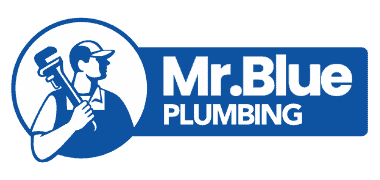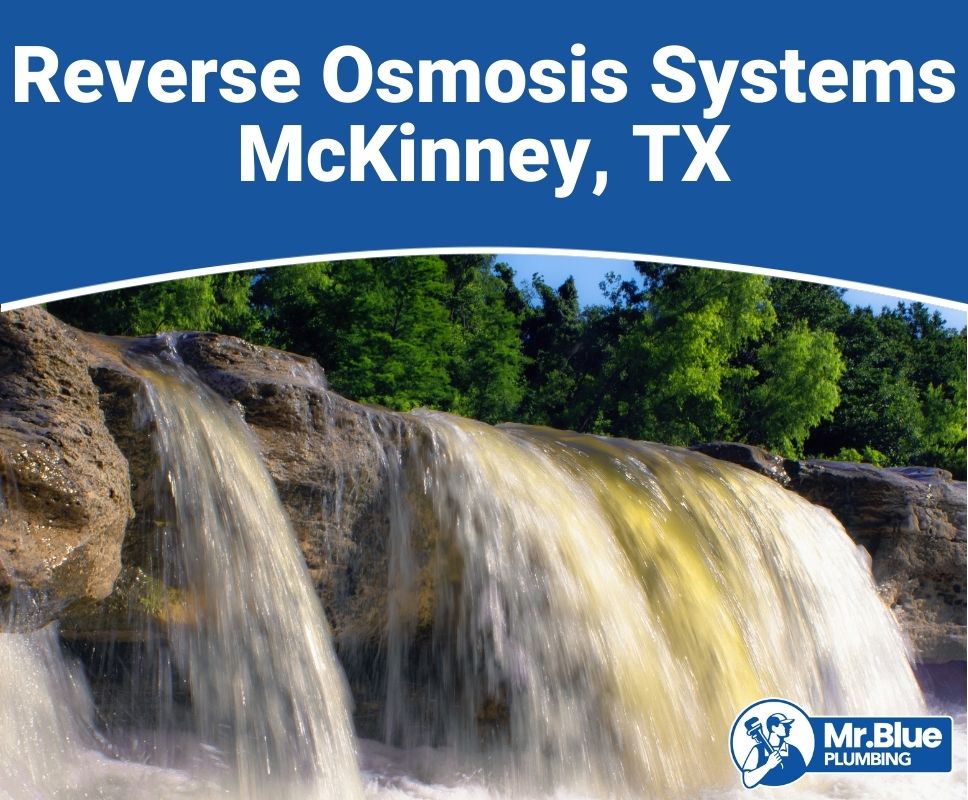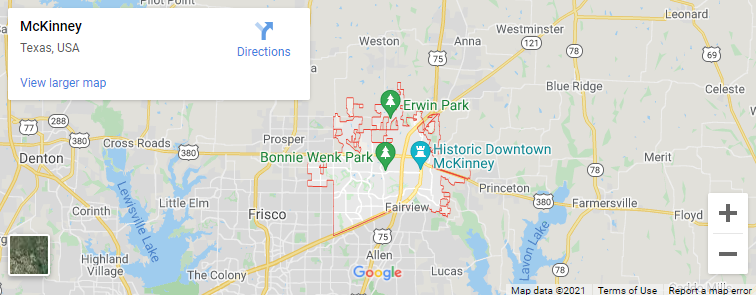Contents (Click To Jump)
- 1 How Much Does Reverse Osmosis Installation Usually Cost in McKinney?
- 2 What Are the Most Common Water Contaminants in McKinney?
- 3 Can Residents in McKinney Benefit From Reverse Osmosis Treatment?
- 4 How Often Should Residents in McKinney Replace Reverse Osmosis Prefilters?
- 5 Do You Need a Water Softener With Your Reverse Osmosis System in McKinney?
How Much Does Reverse Osmosis Installation Usually Cost in McKinney?
Reverse osmosis water treatment systems are the most efficient and cost-effective way to treat tap water. It is the most widely used system in the country. Installing a whole-home reverse osmosis (RO) system costs approximately $1500 but can be considerably higher if certain variables exist.
A point-of-use RO system is designed to be used in just one location at a time, such as the kitchen sink, and is considerably cheaper at approximately $150 to $1300. Commercial-grade RO systems can cost anywhere from $1500 to $20,000 or more.
RO systems work by filtering water through a membrane in a four-stage filtering process. Filters must be changed regularly to provide the crystal clear, pure water this system is famous for.
RO systems are either point-of-use (POU) or point-of-entry (POE). POU systems are also called point of service or single tap. They treat water at one location like a sink or shower. POE systems treat water where it comes into the home. It’s a great option for households for hard water.
The main pricing factor with reverse osmosis water treatment systems is how much water you use and how many filtration stages you prefer. There are also other factors that can sway prices one way or another. Here are the main pricing factors you’ll encounter with RO systems.
Cost Factor: Size and Dimensions
Going for a small POU system is where you’ll save the most money. They fit under the sink or on the countertop. Most under-the-sink varieties have a tank but not all. You can opt for the tankless variety if space is an issue. Smaller RO systems cost less, and you can often get a decent system for $200 or less.
Whole-house RO systems (POE) are obviously bigger and cost much more. They are much more complicated to install and do more work than a POU system.
It’s a smart idea to calculate how much water you use before choosing a specific size for your RO system. Multiply the number of people in your home by 75, which signifies the gallons of water an average person uses per day.
Also, consider the water flow rate. The flow rate shows the gallons of water generated per minute. A low flow rate means you have water pressure issues. Other things to consider include the total dissolved solids in the water, temperature, and how long the water runs per day.
Cost Factor: Stages of Filtration
The more stages of filtration your water goes through, the more the system will cost. Any system with more than three or four filtration stages will cost more than average. The basic filtration stages are pre-sediment, carbon, a semipermeable membrane, and a post-filter. These simple 4-filter systems take out more than 99.9% of total dissolved solids and are safe and acceptable to use for household water consumption, but some systems offer up to 12 filtration stages.
Extra stages are handy options when you have a special issue with your water, like too much sodium. The water that’s delivered is as clean as it comes. Extra filters that could be used are:
- Carbon blockers – to block certain toxic carbons
- GAC – granular activated carbon filters out impurities that can color water
- Alkaline or mineral filters — which introduce healthy minerals back into filtered water
Make sure that your water actually needs extra filters. The four-stage system works perfectly, so unless you have highly contaminated water or severely high sodium content, you may not need any extra filtering.
Cost Factor: System Efficacy
How well your RO system is working is based on two basic factors: how quickly clean water is delivered and how much water you lose in the process. There really is no way to treat water without losing some, however, older systems wasted much more water than today’s modern RO systems.
The first reverse osmosis water treatment systems had a 1:4 ratio of clean water to wastewater. This ratio means one gallon of pure water was created for every four gallons wasted. RO systems today have improved ratios of 1:2. You can even find 1:1 ratio RO systems.
What Are the Most Common Water Contaminants in McKinney?
McKinney gets its water from Lavon Lake, in Collin County, Lake Texoma on the Texas-Oklahoma border, and the East Fork Water Reuse Project, situated along the East Fork of the Trinity River. Our water is tested annually to EPA standards but just like everywhere else, we occasionally experience water scares.
The biggest pollutants come from our own bad habits, so everyone should do their part to keep our water healthy and clean. Some of McKinney’s biggest pollutants are:
Litter
Littering is a bad problem in McKinney. People not only throw whole bags of trash into our natural areas and waterways but also drop little bits of garbage all over our beautiful city. When it rains, the pollutants in the litter seep into the ground with the rainwater. Animals and fish consume it and die which further pollutes our waterways.
Pet Waste
Pet waste is a big annoyance, but it’s also a serious health risk. Wilson Creek and East Fork Trinity River are listed on the Texas 303(d) list as impaired for bacteria because of this issue. McKinney has more than 53,000 dogs and not all owners are responsible.
Yard Waste
Grass clippings, leaves, and other organic matter from your lawn cause major problems for our environment. When it enters the waterways, it increases algae and bacteria that pollute our drinking water. Lawn chemicals are another problem. Fertilizers and weed killers seep into the groundwater to wreak havoc on our environmental system.
Can Residents in McKinney Benefit From Reverse Osmosis Treatment?
McKinney residents find many advantages with a reverse osmosis water filtration system. If it’s contaminants that worry you, or you just want that crystal clear, sparkling ice cubes, reverse osmosis systems better the quality of your water experience in many unexpected ways, including:
Cryptosporidium Parasite Filter
Cryptosporidium are nasty little parasites that live in untreated water. Once ingested, they wage war on your small intestines and cause diarrhea, cramps, and fever. Reverse osmosis filtering destroys them and prohibits their return.
Sodium Filter
People with kidney or liver diseases or high blood pressure face serious health risks when their water contains too much sodium. RO removes sodium molecules from water during reverse osmosis filtering.
Lead Removal Efficacy
The CDC stated RO systems effectively remove lead from drinking water.
Cancer Patients Safe
The weakened immune systems of cancer patients prevent them from drinking or using untreated water. Any tiny bacteria inside can be detrimental. Reverse osmosis filtered water is safe for cancer patients to use however they like.
How Often Should Residents in McKinney Replace Reverse Osmosis Prefilters?
Reverse Osmosis water treatment systems do not function properly when the filters are not regularly changed. Mr Blue Plumbing recommends changing RO filters at least every six months to one year. If your household water is highly contaminated, or you use it a lot, you will likely be changing filters more often.
- The sediment filter is the first line of defense against water pollutants. It helps your system to perform at its best and last for years. Sediment filters should be changed every six to nine months to keep them working well.
- GAC filters protect the semi-permeable membrane of RO systems. They are critical in chlorine removal and must be replaced every six months to a year to keep it in optimal running condition.
- Carbon polishing filters put a final touch on your water before it gushes from the faucet. They use activated coconut shell carbons for a final cleansing.
The reverse osmosis membrane lives longer if all the filters are properly changed. Proper maintenance can help your RO system last for years and even longer if you have soft water.
Do You Need a Water Softener With Your Reverse Osmosis System in McKinney?
There is a common misconception that you must have a water softener in order for an RO system to work its best. This is only partially true. If you have hard water, you’ll certainly be doing yourself a favor by using a water softener with your RO water treatment system. Even more so if you also have a high sodium content. But by no means does that translate to their necessity in every case.
Soft water is already filtered and in most cases, this provides adequate filtration before it hits the RO.
Both water softeners and reverse osmosis systems are helpful for water, but they are not the same.
A reverse osmosis system filters out the minerals that are dissolved in hard water, but they clog up the filters and undermine the system. Using a water softener first helps prolong the life of the filters and the entire reverse osmosis system.






